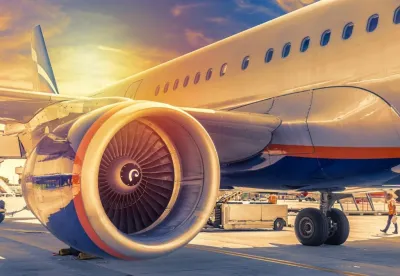
At their annual meeting in Dubai, the IATA (International Air Transport Association) and a diverse group of stakeholders, including airlines, government authorities, international organizations, OEMs, fuel manufacturers and suppliers, airports, and corporate travel management companies, united in a significant step towards a more sustainable future for air transport. They jointly announced the establishment of a SAF (sustainable aviation fuels) Registry, a crucial initiative set to launch in the first quarter of 2025.
The Registry, a testament to collective leadership and expertise, is designed to accelerate the adoption of sustainable aviation fuels and ensure accurate tracking and reporting of emissions reductions from SAF. The Registry is projected to contribute to up to 65% of the total carbon mitigation necessary to attain net zero emissions in aviation by 2050.
Sustainable aviation fuel (SAF) is not just a necessity, but a powerful tool for reducing aviation carbon emissions. The SAF registry, by meeting all stakeholders' needs and increasing production, has the potential to make a significant contribution to this crucial mission. It holds the promise of making a substantial impact on aviation's carbon footprint. Governments are in need of a reliable system to monitor the quality and quantity of SAF used, while producers require accurate tracking of deliveries and carbon reductions. The SAF Registry is the answer to these needs, and its potential to reduce carbon emissions in aviation is immense.
As a facilitator, IATA works in tandem with certification organizations and fuel manufacturers to standardize data for efficient processing. The SAF Registry promotes sustainable aviation fuels and will also aid airlines in meeting regulations such as the Aviation Carbon Offset Reduction Scheme (CORSIA) and the EU Emissions Trading System. The Registry fosters a sense of security and trust in the industry by ensuring adherence to SAF requirements and providing transparency to authorities regarding emission reductions.
The Registry will also ensure that industry-accepted SAF accounting and reporting principles align with international protocols and best practices. Participation in the Registry will be based on recovering expenses, ensuring efficiency in terms of charges, and avoiding unnecessary cost barriers to the increase in the use of SAF.
A Government's Involvement Is Crucial
Governments’ active participation is not just important, it is crucial. Specifically, their role in ensuring compliance with civil aviation authorities' regulations is vital. Competent authorities should swiftly validate and approve declarations, update national emissions inventories, and align their actions with recognized standards of the International Civil Aviation Organization (ICAO). This level of commitment is key to the success of the SAF Registry and the overall goal of reducing carbon emissions in aviation.
IATA has announced that it is well on track to triple the production of Sustainable Aviation Fuels to 1.9 billion liters (1.5 million tonnes) by 2024, which would account for 0.53% of aviation fuel needs.
Renewable fuel production is a shared responsibility among many industries, and expanding it is vital to bolstering SAF's potential. Approximately 140 renewable fuel projects that can produce SAF are expected to be operational by 2030. If all goes according to plan, the total renewable fuel production capacity could reach 51 million tonnes by 2030, with production capacity spread across almost all regions.

Reduction Targets by 2030
Governments, through ICAO, have set the goal of achieving a 5% reduction in CO2 emissions by 2030 with the help of SAF. To reach this target, it is expected that about 27% of all renewable fuel production capacity available in 2030 will be SAF, which currently only represents 3% of all renewable fuel production. There is a growing interest in SAF, and the potential is significant. However, for airlines to be able to purchase SAF in the necessary quantities, governments must now implement policies to ensure this.
There are several potential solutions to expedite aviation access to critical quantities of SAF:
Diversify raw materials: approximately 80% of SAF produced in the next five years will likely come from hydrogenated fatty acids (HEFA), used cooking oils, and animal fats. Accelerating the use of other certified routes and raw materials (including agricultural ones, forest residues, and municipal waste) will significantly expand the production potential of SAF.
Existing refineries can co-process up to 5% of approved renewable feedstock alongside crude oil streams. This solution can be implemented quickly and expand SAF production. However, policies need to be put in place urgently.
Incentives should be provided to encourage improving the production mix of renewable fuel plants. Currently, these plants are primarily focused on maximizing diesel production and often receive incentives to meet the demand for road transport. However, as the transportation industry moves towards electrification, it is essential to establish policies that shift production to meet the long-term demand for sustainable aviation fuel (SAF) for air transportation. Targeted incentives can facilitate this transition from renewable diesel to SAF.
Strong political support is needed to rapidly increase the production of all renewable fuels, particularly sustainable aviation fuel (SAF), to boost investment in renewable fuel production. The United States face a significant challenge and is considering investing $3 billion. Stable, long-term tax credits are essential for existing and new facilities to maximize SAF production capacity.
A recent IATA survey revealed significant public support for SAF. Approximately 86% of travelers agree that governments should incentivize airlines to use SAF. Furthermore, around 86% of airline passengers believe major oil companies should prioritize SAF production.










